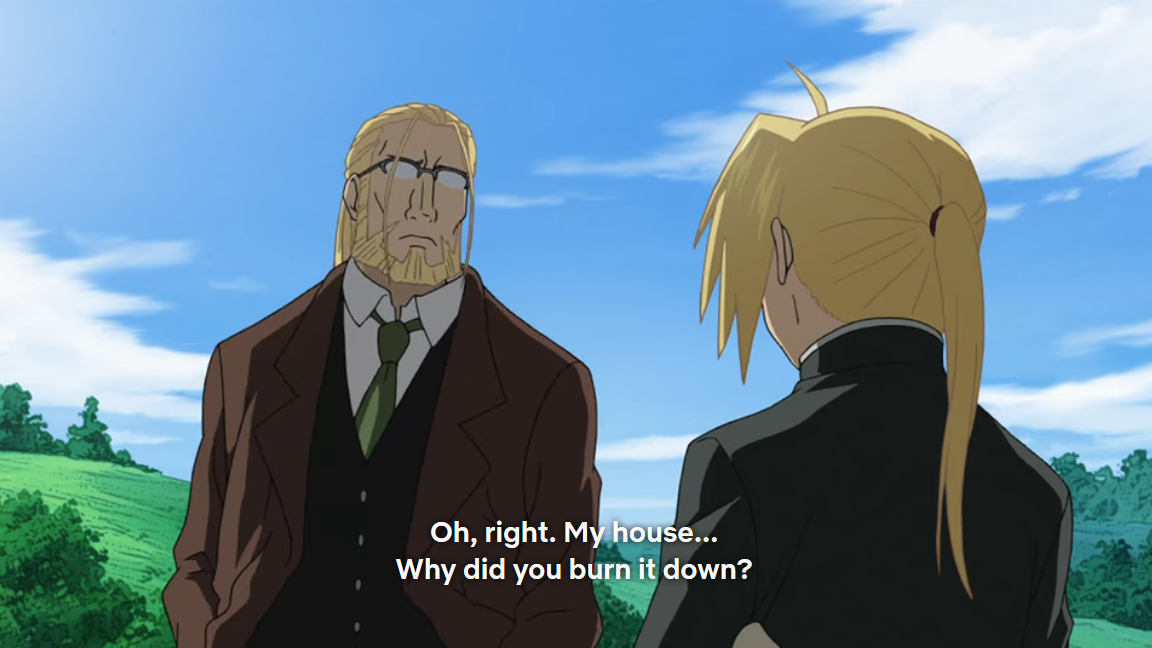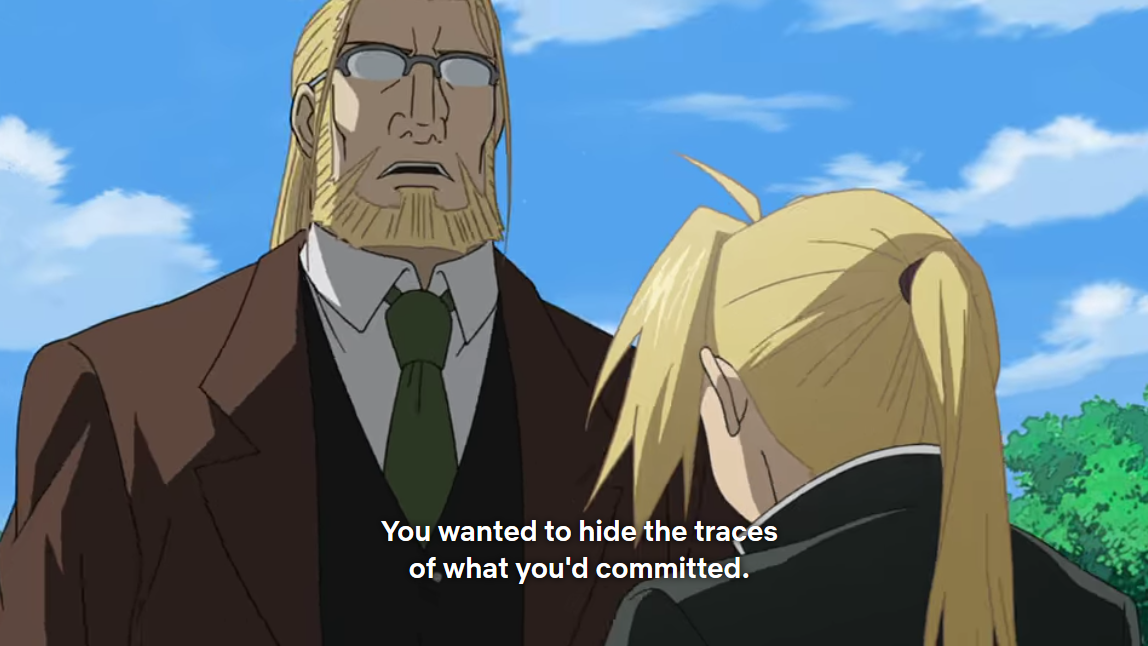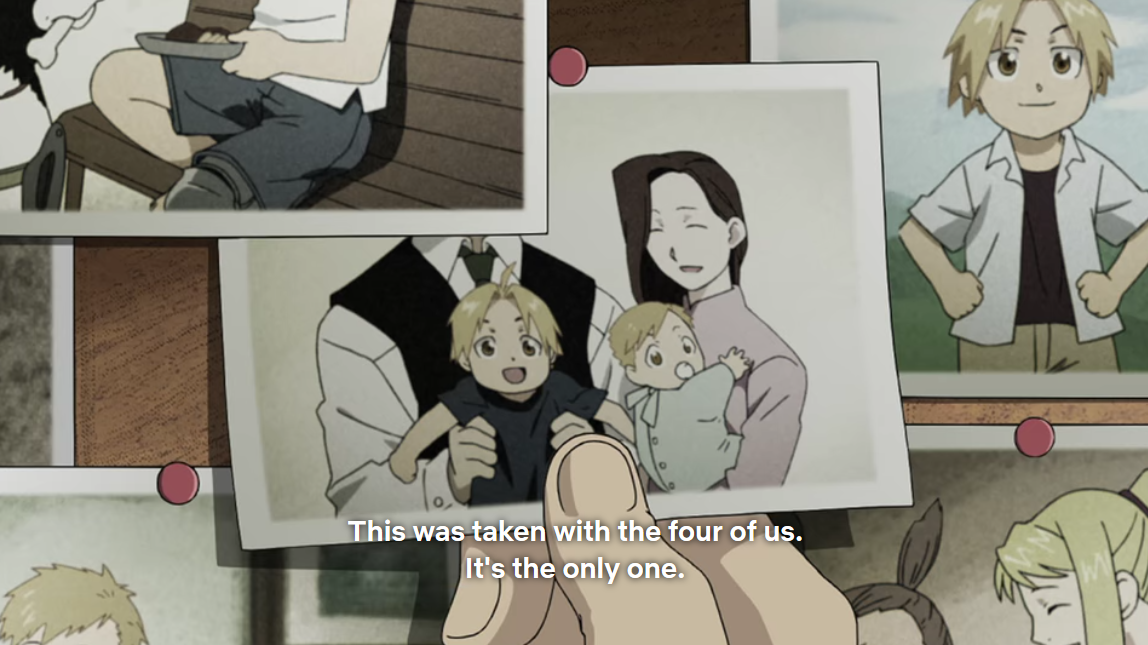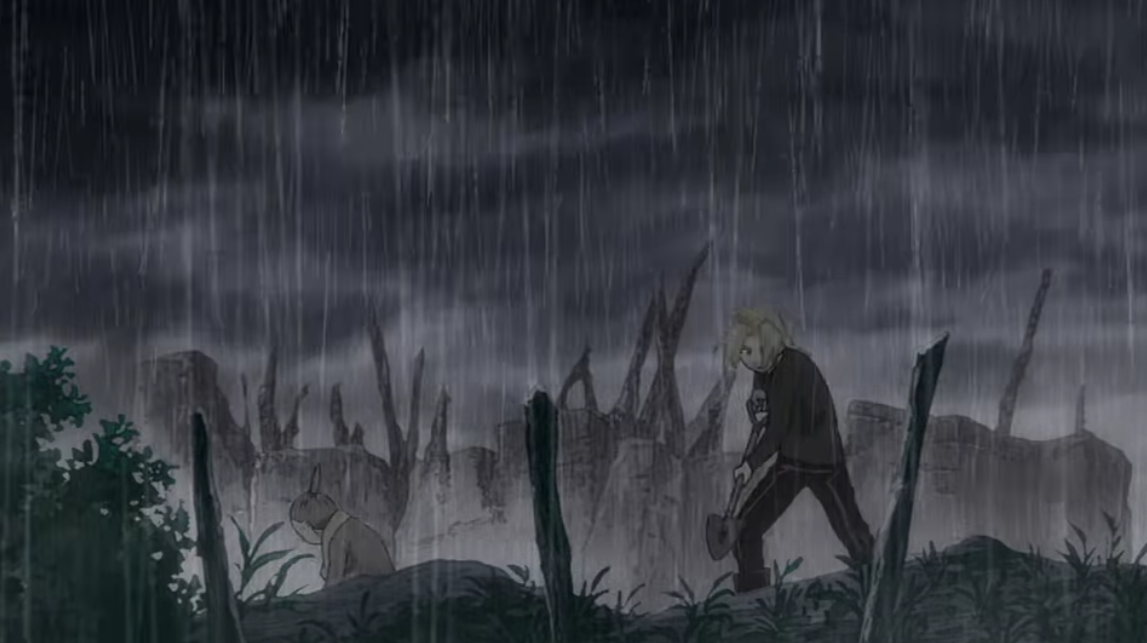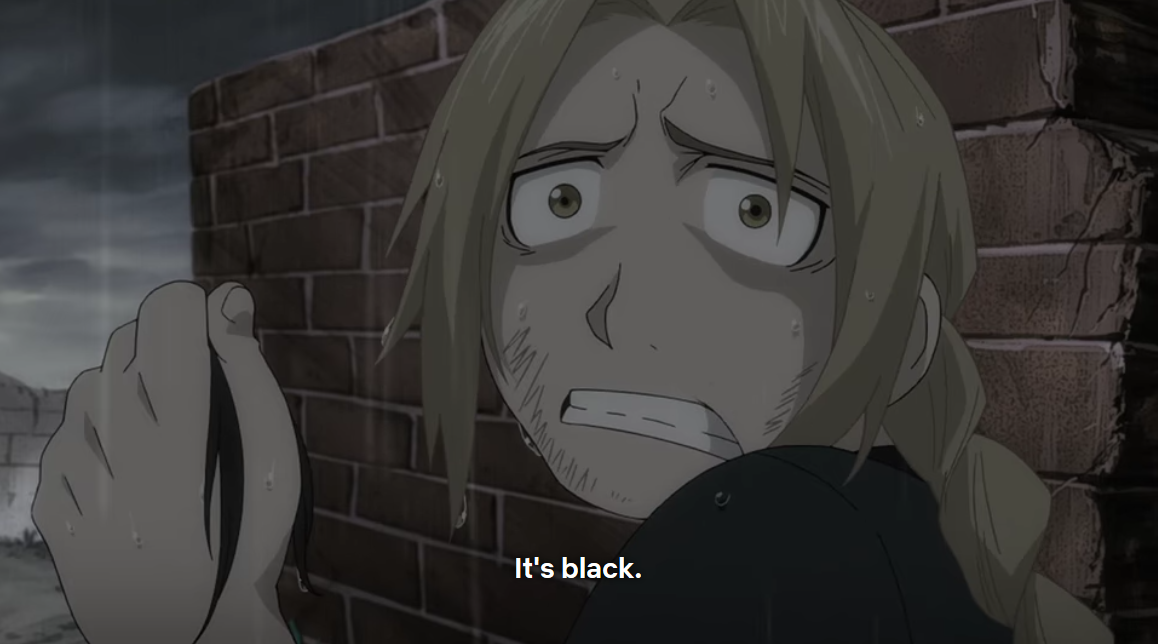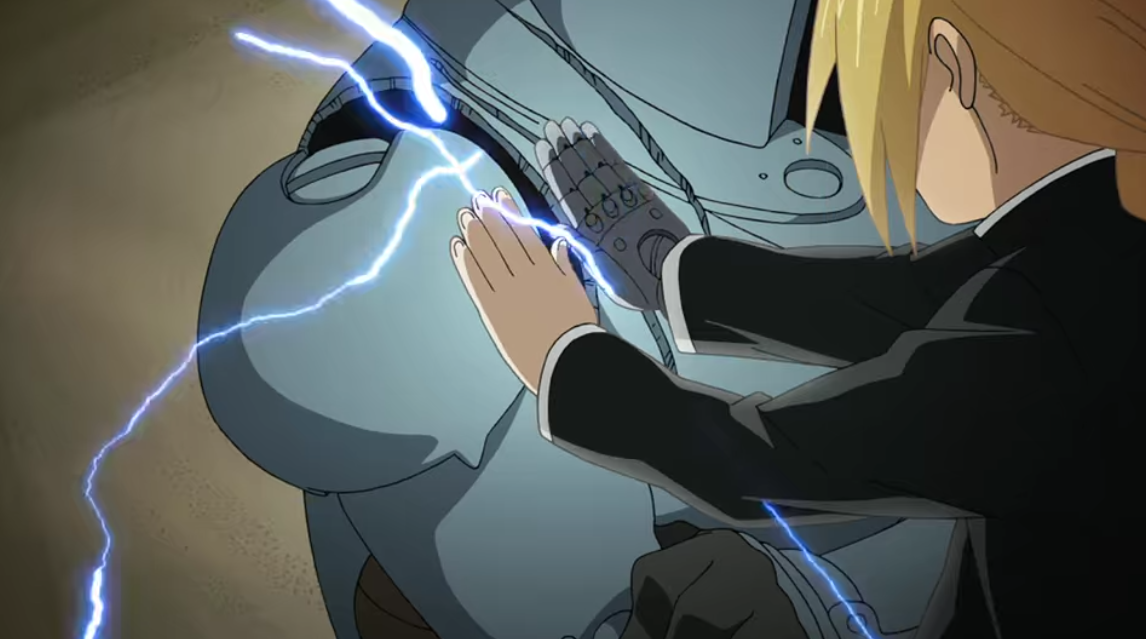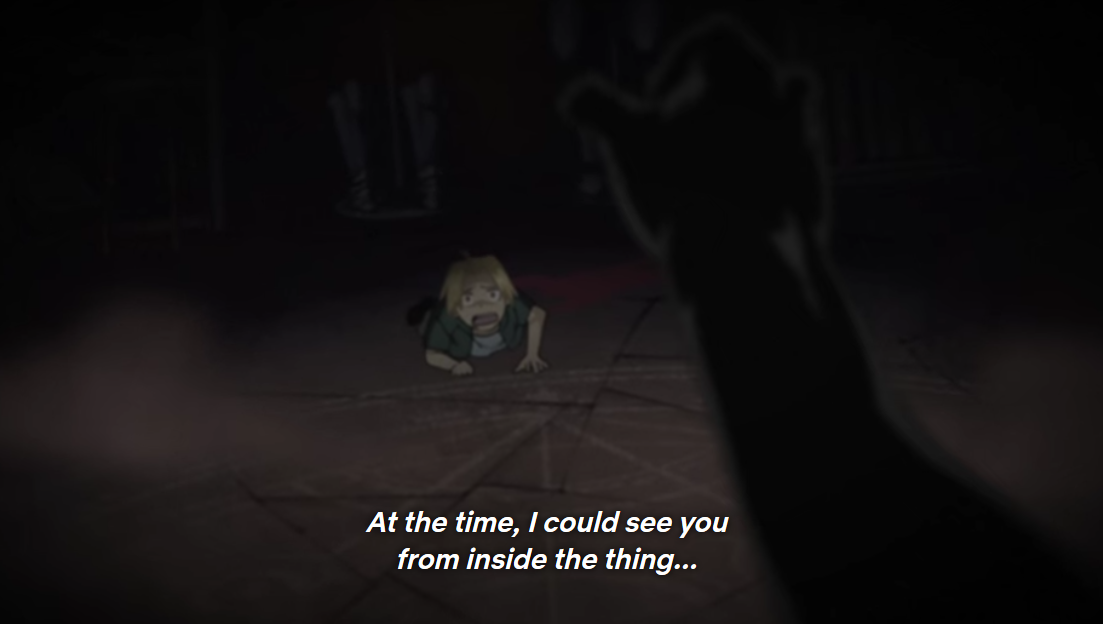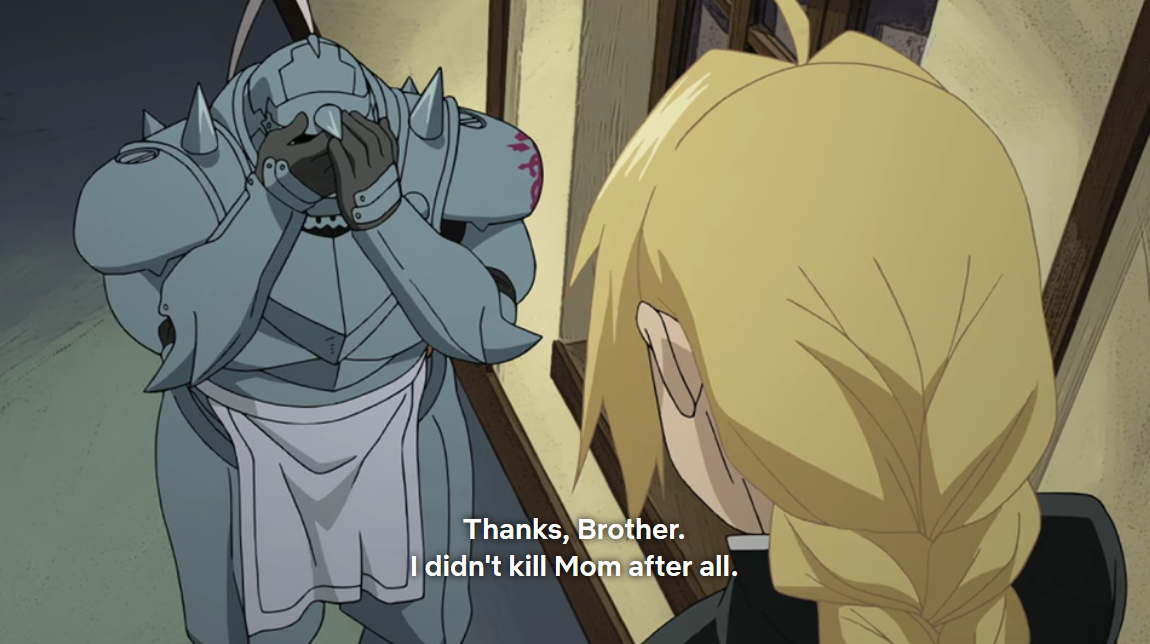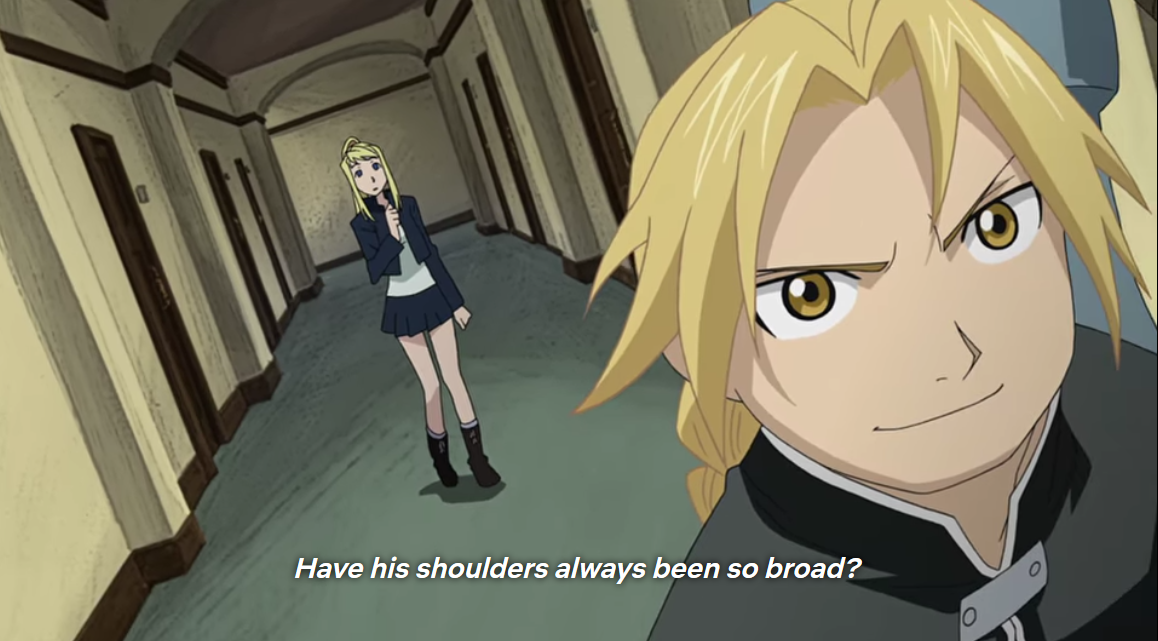Fullmetal Alchemist Brotherhood S1E20: “Father Before the Grave”
Probably the most literal title so far, given that the previous episode ended - and this one opens - with the Father standing in front of a grave. After the OP, he makes himself the first character that I can recall to tell Edward that he's gotten taller in the show thus far. He also mentions, very nonchalantly, that Winry's grandmother Pinako already told him about Edward and Alphonse's human transmutation attempt and its aftermath. Did he just talk to her now, or have the two been in contact previously since he went missing?
Regardless, Father barely looks at Edward, and speaks as unemotionally as ever until Edward raises his voice at him. Edward tells him he doesn't belong here anymore, which prompts him to actually turn his attention to his son and ask a related question.
I definitely got a little chill there, when he started pressing him. But what I really like about the production is how understated and almost bland Father comes across here. He's scary because we know what he's capable of, but the animation and voice acting all just says "distant, socially awkward middle aged guy." The mundanity grounds and emphasizes the monstrosity. It makes him feel much more real, and therefore threatening.
Edward gives him the usual line about how he and Alphonse wanted to remind themselves there was no going back, but Father unsurprisingly doesn't buy it. Ohhhh, we're finally getting into this! I always found Edward's explanation for this to be suspect, but at the time I didn't know enough about him or the broader situation to make any real guesses about his (and Alphonse's? How DID Al really feel about that decision?) true motivations. Father tells him that Edward really just didn't want to have to look at those memories. He didn't want a reminder of these failures.
As he speaks, he glides forward and looms larger and larger over Edward with no music or other sounds to distract from his voice, and it's kinda of completely terrifying.
Not just because of what he's saying, but because of what he's NOT saying.
...
It hadn't occurred to me right now that Edward's burning the house might have been an act of spite. But the more I think about it, the more obvious it seems. He blamed his father (rightly or wrongly) for Trisha's death. We know that that anger was on his mind when he set about researching human transmutation.
This is an Oedipus complex type deal, isn't it? From Edward's perspective, his father took his mother away. Reviving her would have been his victory over Father, stealing her back from him. When that victory was frustrated, he burned the house in desperation for another one. Or at least as an act of rejection. Banishing Father from his life by destroying the home they shared together and removing any remaining reason he'd have to return to Resembool. Father did just ask him "why did you burn MY house down," not "why did you burn OUR house down." He sees it as his own, and he probably thinks that Edward saw it that way too when he decided to burn it.
What makes this scary is that we've seen what Father does when his children openly reject him.
...
Edward is unable to face his father, and runs. Father doesn't pursue or shout after him, or even try to vaporize him with a lightning bolt or anything. Just stares after him, and says "just like when I was young" in an earnestly regretful voice quite unlike his usual deadpan.
Huh. This doesn't feel right. Either we're seeing a hint of a very different side of this man, one that hardly ever comes out, or...hmm.
Why DID he take time off to live in an idyllic rural village and have a pair of (probably) human offspring?
I'm starting to feel like I've been trying to put the puzzle together prematurely, without realizing how many pieces were still missing.
Cut to that night. Edward is staying with Pinako. I wonder how long he's planning to stay in Resembool, come to think of it? Returning to Central might not be the best idea at the moment. As he sleeps, Father enters the room and stands over him, watching in silent contemplation. He reaches out, either to wake Edward up or kill him in his sleep, but changes his mind and withdraws his hand. He stares a moment longer, and then creeps out of the room. A few seconds later, Edward opens his eyes and stares at the door suspiciously. Faking asleep. Good call, Edward.
Father goes to the dining room, and sits down next to Pinako. She marvels at how he hasn't aged at all in the entire time she's known him. She looks at an old photo from when they did automail stuff together. Turns out Pinako was quite a looker back in the day, but more surprising than that is Father's expression.
This would have been a long time ago, going by Pinako's youth and hotness, but not THAT long ago. Certainly not more than five or six decades. That smile, that sort of social life and peer group...from the same time period that he'd have been masterminding Wrath's rise to power?
...are there two Fathers?
Hold on a second. There might actually be MORE than two of them!
The Great Eastern Sage, and the Great Western Sage. Those two must have been concurrent, if both are said to have come to Amestris and Xing immediately after the fall of Xerxes. Two places at the same time. They looked different, sure, but not THAT different, and if there were at least two...
A "batch" of Xerxian haemonculi? Following different agendas in the wake of a Grandfather's death at Xerxes?
Damnit, getting ahead of myself. Need more information. Still waiting on puzzle pieces. But it's looking more and more likely to me that this is NOT the same guy who we saw holding court under the capital building. However that might be. The timeline, the personalities, there's just too much that doesn't add up, and the simultaneous eastern and western sages definitely feel like a hint.
The topic turns to the brothers' mishap, and the entity that I'm just going to call "Hohenheim" for now even though that probably still isn't his actual name starts asking some pointed questions. Pointed in a different direction than I'd have expected though. He asks Pinako, very intently, about the physical appearance of the brothers' failed creation. Whether she could tell if it actually had Trisha's hair and eye colors, for instance. If it was really "her," or something else. Pinako doesn't answer directly, but asks him if he's saying the boy's lost their bodies for transmuting a different human altogether. Which suggests that malformed and unfinished though Trish 2.0 might have been, she had enough identifying details for Pinako to not recognize the original's.
The music gets tense. Edward listens from outside the door, and looks horrified.
Probably a combination of "all that was for even more of a nothing than I thought" and "oh shit, I almost created one of those monsters that we've been fighting didn't I."
Back to Central. Yao is still interrogating Alphonse about his body. Al tells him what he recently learned, about his lifespan as a golem being potentially unstable, and Yao asks him if it would be possible to just keep transferring his soul into new constructs every few years to renew it.
...
"Lurking" starts playing here, and there's an uncomfortable silence between the characters. I have a feeling that Yao just stumbled into the answer for a different riddle, and the audience is meant to remember it.
Heavyhanded direction, but I guess this is one of those cases where too much is better than too little.
...
Yao is also intrigued by Alphonse not needing to eat, breathe, or sleep, and seems very excited at the possibilities. Either Yao really needs to learn to appreciate what the human body offers, or he's thinking about the potential for tireless slave laborers rather than transforming himself. Probably the second one. Finally, Winry gets up and asks Yao if he can stop being such a raging fuckhead for just a few goddamned minutes before storming out of the room. Rhetorical question, by now she's got to have figured out that he can't. Alphonse follows her out, and they sit morosely in the bedroom with the question of Alphonse's life and quality thereof hanging over them.
Cut to Edward having a divine revelation. Or just a dream. It's hard to tell with someone who's actually seen God before and therefore has the potential to dream/hallucinate about it again on his own. Whatever the case, Edward is in a psychedellic gray void talking to Wogdat. Edward is begging for him to give Alphonse's body back, but Wogdat tells him that *he* never took Alphonse's body.
That sounds a lot like "look what you made me do," but that's hardly surprising coming from Wogdat.
Shou Tucker shows up next, Alexina at his side, and gloats about how that means Edward really *is* just like him after all. Then Trish 2.0 is in Edward's face again complaining about how badly he fucked her up and, yeah, this is a dream alright. Ed wakes up in the Rockbell guestroom. Pinako tells him that Hohenheim is about to leave again, if he wants to say goodbye. He doesn't, and when we see Hohenheim again he's completely uncaring about this.
Before leaving, Hohenheim takes a photograph from the Rockbells' wall and asks Pinako's permission to keep it. It's the only remaining photo that shows him, Trisha, and both the boys all together after his own house got burned down.
His own face is covered. Wonder if Edward did that on purpose when he and Al moved in and presumably brought this picture with them?
In return for giving him the photo, Hohenheim gives Pinako a warning. Something bad is going to happen in the near future, and she should leave Amestris as soon as possible.
She gawks at him, and says that she can't just up and leave when her granddaughter and his sons depend on her to keep a proper home for them in existence. Hohenheim just says that she's been warned now, and leaves without another word, lamenting to himself that he's not going to be able to enjoy her cooking anymore after this. And he gets the anime villain glare on his glasses again.
Okay, maybe this really is Father after all. Although...that doesn't solve most of the other incongruities. Maybe Hohenheim and Father aren't the same person, but one of them is impersonating the other? If they're identical, and know each other well enough to copy mannerisms etc, then that wouldn't be too hard to pull off.
...
Full disclosure here. During my writing of this review, someone on my Discord server made a real point of going out of their way to spoil me on the fact that Hohenheim and Father are not the same person. Part of this review was already written by then, but most of it wasn't. I've been trying to compartmentalize that knowledge and react to the show's text as it comes, and I think I've done a good job. I'm pretty sure I'd have had these same suspicions at the same times throughout the first half of this episode without having been spoiled.
The problem? At this point, I'd probably say "nevermind, this is just Father, I was reading way too much into way too little with that evil twin theory." But I don't know for sure, because I've been spoiled on that theory's correctness. Would I have made that mistake here, or not? I can't tell.
So, this might actually be Hohenheim, or it could be Father impersonating Hohenheim, but I know there's two of them. I know nobody's cared any of the previous times I've done this, but I'm going to meet the definition of insanity here and ask you all to please stop spoiling shit.
...
After the ancient Xerxian of unclear identity leaves Resembool, Edward takes Pinako up to the ruins of the Elric house. They bring shovels. Pinako doesn't seem to think this is a good idea, but Edward insists, even when the rain starts.
He's not using his alchemy to dig, despite earth-reshaping being a signature power of his, but I imagine there'd be a strong risk of destroying the remains if he used that. Edward's digging is obsessive. Pinako starts getting worried about him, but he just digs faster. Finally, his shovel cuts into Trish 2.0, and it only takes a cursory examination to confirm that whatever he and Alphonse created, it wasn't actually their mother. Not just in the sense of it having been deformed and unfinished. It was a deformed and unfinished version of a completely different person.
Black hair. We haven't gotten to see any of Trisha's own family, so there might be some black hair genes in there somewhere, but we've seen no sign of it. Given how much Edward and Alphonse take after their father, I'd have expected their creation's "soul data" to err in the opposite direction and be blonder than Trisha rather than darker. Curious. Further investigation reveals that the skull and hips are masculine, among other unfitting details.
Edward is horrified, but then starts laughing maniacally. When Pinako manages to calm him down, he says that he knows it's possible to fix Alphonse now, and also that he knows it's impossible to bring someone back from the dead.
There's a logic chain here that I'm not following, and I'm not sure if it's because I missed something or if Edward just hasn't filled us in yet.
When they get back to the house, Edward calls Izumi and tells her about this discovery, and asks if she can confirm the identity of her own failed haemonculus. She gasps and widens her eyes before she hangs up. I think she realizes what Edward is getting at. I don't, but hopefully I will soon.
The following morning, Edward and Pinako visit the graveyard again. Edward tells her what he learned about her son and daughter-in-law's careers and deaths. She seems to take comfort in hearing about what they did. She asks Edward if he knows where his father might have gone, and he replies that he neither knows nor cares. Pinako insists that Hohenheim really does care about his sons, even though he doesn't show it. Erm....maybe? We've been getting some pretty mixed signals on that front.
The talk of Hohenheim makes Pinako remember something that she'd been supposed to tell him, but his reappearance was such a surprise that she forgot all about it until now. Before Trisha died she had some last words for him which she asked Pinako to relay as soon as possible. She said to tell him that she "couldn't keep her promise, and that she was dying before him after all, sorry."
Was he trying to make her immortal, too?
Was she a patient of his, as well as his wife?
Actually, hold on a second. What if we're actually multiclassing Oedipus and Pygmalion, here? Maybe it was coincidence that she died during the plague, and actually it was her battery running out before he could get a chance to recharge it?
That's a stretch. But if it's true, then...man, how many actual humans even are there in this story?
Anyway, Edward isn't sure what to make of this either, but insists that he's not inclined to go running after Hohenheim. He'll relay that message if they happen to meet again though.
Edward returns to Central. Wonder if he had been planning to stay in Resembool longer until Hohenheim's appearance made him uncomfortable there? He gets back to their quarters, where he freaks out at the state of Alphonse's suit and even moreso at Yao and one of his ninja's being in their suite. He rectifies both situations with all due haste.
Once Alphonse is restored and the trash is taken out, Edward tells Winry and Alphonse that he knows Alphonse's body is restorable. Ed, do you feel like explaining your damned self already, or not?
Well, he explains himself, and...wow, this one's a doozy.
First, he confirms once again that Alphonse has childhood memories that Edward himself wasn't present for, and Winry can verify their accuracy. We already resolved that question back in "Created Feelings," and while I can see how the audience could use a reminder at this point it seems a bit odd to me that the characters would. Anyway, Alphonse is actually Alphonse, not just a simulacrum accidentally created by Edward.
Second, he establishes that the body they created, whatever it was, didn't have anything to do with Trisha. The only material link to her, specifically that they used was their own blood, which only carried part of her genetics. And based on the form their haemonculus took, it didn't seem to have latched onto that particular part of their ancestry.
Then, Edward brings up the most unfitting detail of all. Why did Alphonse's body get completely claimed by Wogdat, while Edward only lost a single limb? He presses Alphonse on what exactly his recovered memories from the Gates of Truth included, and Alphonse recalls an image that we saw BRIEFLY in earlier flashbacks, but that I didn't realize the significance of at the time.
A POV shot from the haemonculus' perspective.
The haemonculus only started writhing after Alphonse was disintegrated, and only stopped again once Edward bound his soul to the armor. Both of these events caused Edward to lose a single limb. The cost of transferring a human soul from one receptacle to another is a single limb, and Edward did it twice.
I guess the chances of Edward's dream having been an actual divine vision just rose a bit, if Wogdat was giving him actual information with the "I didn't take his body, you did" thing. Though I guess it could have also just been Edward's subconscious figuring things out before he realized it. If the former, then that was an unusually helpful gesture from old buddy Wog-Sothoth. Maybe he's not quite as awful as I've been thinking.
Well, this also explains why Alphonse was so traumatized by those memories and ended up suppressing them. It isn't just that he was submerged more fully into the Truth. He also spent a few moments as that suffering, wretched thing on the floor.
...
Hmm. One issue here is that we still don't know why Alphonse's original body disintegrated rather than just dropping dead. That didn't happen to Barry's body, either when the lab 5 staff transplanted him into the golem or when his glyph was destroyed. It also, of course, didn't happen to the deformed haemonculus body when Edward transplanted Al for the second time from it into the armor.
Another question is why Barry and the Slicer brothers didn't meet Wogdat, if they were subjected to the same process that Alphonse was. Maybe they did, and just assumed they hallucinated it? Perhaps, due to them never having been alchemists to begin with, they weren't able to gain any usable knowledge or power from the experience like Ed and Al were?
That second detail isn't terribly important to the plot, but the first one is since both Barry's and "Trish's" remains continuing to exist have been critical to this very episode. Hopefully it gets explained soon.
...
Anyway, the brothers are overjoyed for two reasons. The first is that this means they DIDN'T inflict any pain or trauma on their mother's soul and possibly damage it irreversibly. They inflicted more pain and trauma on Alphonse than they realized, but that's still better than what they'd feared.
This also explains why Shou Tucker was able to get under Edward's skin so easily; Edward was haunted by the possibility that he actually HAD inflicted an Alexina-esque fate on an innocent person, if only briefly. OKAY, that makes sense now. Personally, I never thought that Trish 2.0 had a consciousness at all, and that its very brief wriggling and breathing were just the equivalent of electrifying a frog carcass, and it didn't occur to me that Edward or Alphonse might have thought otherwise. In retrospect, Edward so adamantly insisting that you can't bring someone back from the dead in "City of Heresy" might have been like him adamantly insisting that there's no god. He feared that it actually might be possible, and was heavily in denial about it. Turns out that he was right about resurrection, but wrong about god.
The second reason is that the form of human transmutation they'll need to fix Alphonse might be much easier than they realized. They WERE able to create something like a human body, imperfect though it was, unlike their complete and utter failure to conjure a soul. That suggests that creating a human body might not actually be divinely prohibited (which also explains how alkahestry is able to work, come to think of it), just hard to get right. So, if they can figure out how to create a better synth body, and acclimate it to Alphonse's soul to prevent rejection issues like zombie!Barry had, then they should be able to install Al into it at the mere cost of...well, Edward only has two organic limbs left, so they're pretty valuable to him, but maybe he could pay some Rush Valley weirdo to volunteer. Regardless, the important part is that this whole time they've been operating on mistaken premises, and now that they understand the actual problem it seems much likelier that they can solve it.
They get a call back from Izumi, who gives them a comforting but also mystifying answer. The baby she tried to create was not a phenotypic match with the one she and Sig lost. Just like with the Trish body, she failed to bind the construct in any meaningful way to the dead person. The mystifying part, though, is that it's not a phenotypic match for any part of either her or Sig's family tree at all. It could not have possibly been derived from their genetics.
Now THAT'S odd. Whose genetics have they been tapping into, then?
Also, if Izumi met Wogdat and lost...hmm. She's implied to have lost her uterus, whereas both times that Edward did it he lost a limb. Okay, yeah, there's a difference here. If Izumi met Wogdat like Edward did, then she was probably performing the same sort of operation that he was, but she didn't disintegrate anyone. Was her baby-haemonculus (baemonculus?) moving for a little bit after she created it? I don't remember. If so, who was inhabiting it during that time?
More information needed. There's a lot about this process that we still don't know, and I'm optimistic that these questions do have answers. Fullmetal Alchemist has had its share of plotholes, but never about this sort of thing.
She thanks them for putting her own conscience at rest. Like them, she'd been living in silent horror at the possibility that she'd tortured the soul of her child and subjected it to a second, much more horrible death.
Heh, well. Like I said, I never thought those failed creations had anyone home in the first place, but if I were in Edward or Izumi's place myself I probably wouldn't be nearly as rational about this. Ashamed I didn't think of this before. So much about both of these characters makes a lot more sense now.
Edward tells Alphonse that they've got a better chance than ever of restoring him before his golem body gives out. Alphonse tells him that thinking about it more, he was probably being too pessimistic about his current body's lifespan to begin with. It could shut down at any time, sure, but that's equally if not more true of a human body, so...really, it's not worth worrying about. They head out to start some new lines of research, eagerly talking about how they're going to use the power of friendship brotherhood to defeat God.
Winry, like Hohenheim, notices that Edward finally seems to be getting taller and broader shouldered. And he’s a YA protagonist, so physical growth is a symptom of emotional maturity and sense of responsibility rather than time and hormones.
End episode.
Not all that much really happened in this episode, but a great deal was learned, and a great deal more hinted. After the last action-packed installment, this makes a nice change of pace. More importantly, this episode went a long way toward restoring Edward's agency in the story. This was mostly just learning things, sure, but HE was the one who made the discoveries. He didn't just happen to be on location when something happened, or have someone else seek him out to tell him things. He acted on his own initiative to ask questions and gather evidence, and that action is having consequences.
It's probably not a coincidence that Mustang didn't appear at all in this episode. I do like him, but this show is bad at balancing multiple protagonists, and I was already invested in Edward's story before Mustang came into the spotlight. So I can't help but resent Mustang a little when it’s his turn to get to do things.
Anyway. Some questions answered, many more (especially about Father/Hohenheim, and about the stranger details of human transmutation) raised. Well done character development and exploration underscoring it all, and a much needed re-grounding of a story that seemed to be getting away from itself a bit. One of the best episodes of the show so far.
